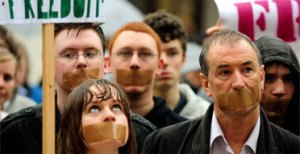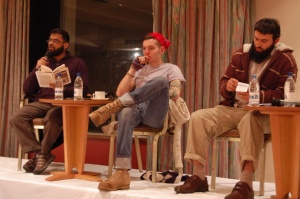Filed under: Uncategorized | Tags: chris arendt, Moazzam Begg, prisoner/guard conversations
The Cageprisoners Two Sides/One Story tour ended in Cardiff, UK, on February 4th. Luckily, someone recorded the last night so you can watch Moazzam and Chris’s final public conversation.
Moazzam’s introduction – talking about how it felt to have a gun held to his head.
Moazzam interviewing Chris: “What sort of abuses did you see and what did you participate in?”
Filed under: Uncategorized | Tags: aerosol ali, aerosol arabic, birmingham, free gaza, political art, street art
One corner of Coventry Road, the heart of Birmingham England’s Muslim neighborhood, has been covered in a coat of fresh paint. Cars slow to stare and people come to take photos. “FREE GAZA!” reads the blazing text, as spray painted fire engulfs silhouettes of homes, a Palestinian flag waves from a bloodied fist and one man throws his shoe at the whole mess.
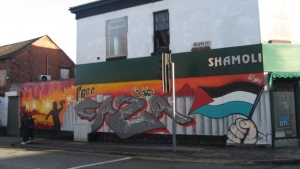
Birmingham Gaza Mural
This is the work of Aerosol Arabic, an artist born and raised in Birmingham who’s well known around town for his graffiti. But while his most recent work his most prominent, surprisingly the Muslim artist has only recently gotten political.
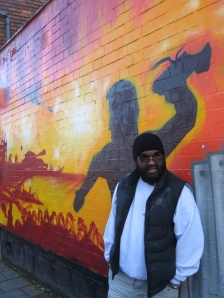
Ali & Shoe Thrower
One day after Birmingham’s big pro-Palestine protest took over the downtown streets, Aerosol Arabic (whose real name is Ali) meets up with Chris Arendt and I in front of his Free Gaza mural. We converse two or three sentences at a time — his cell phone is ringing constantly. Everyone has seen the mural. It’s a bold and instantly iconic addition to the neighborhood and every Muslim in Birmingham, it seems, has something to say about it. “My two year old daughter has started saying ‘fee gatha! fee gatha!'” laughs Ali. Across the street, a man with a tiny handheld camera is filming the mural and talking to himself. Ali crosses over to him and it turns out the man has decided to make a homemade documentary about the mural. It will join the other one Ali’s friends made that’s already up on YouTube. That’s two impromptu documentaries about a piece of street art that’s only existed for week.
We pile into Ali’s car and suddenly Chris and I are on a personal graffiti tour of Birmingham. He grew up tagging these streets, but his work has changed a lot since he came of age with a spray can in hand. “I was far from politically aware or religious, I was just doing graffiti like any kid… it meaningless stuff really, just writing your name,” he says. “That’s what graffiti was all about at the beginning, it wasn’t about communicating any message, it was just writin’ your name in big letters.”
Down on Stratford Road, Birmingham’s other major amalgam of halal restaurants and sari stores, Ali pulls into a parking lot and gestures toward a white wall tagged with the giant phrase he painted a year ago, “Feed the Poor.”
“Ten years ago when I started to become more inspired by my faith as a Muslim, that’s when I started to incorporate spiritual concepts into my graffiti. So it was mostly concepts, words like knowledge, patience, beauty, brotherhood, community things like these that people of all faiths can appreciate really.”
Just down the road is another of his new works – a blood-red “Palestine.” The wars in Iraq and Afghanistan got Ali thinking politically, but it’s the recent crisis in Gaza that pushed him to politicize his art. He’s still fitting into the new role. “I find it kind of scary to get up and deliver a political message. Banksy can get away with it but, you know, as a Muslim…”
He offers to take Chris and I out for daal and it turns out to be an opportunity for him to start filming a documentary of his own. He pulls out his camera in the tiny kebab shop and converses with Chris on camera about life in Guantanamo. “What did you miss most when you were there?” Ali asks. “Everything,” says Chris, pausing to add “girls” to the beginning of a very long list. When Chris pulls out the little zine he made about his experiences as a guard, Ali looks at it black and brown cover for roughly one second before saying, “You ever thought of spraying this?”
And that’s how we wind up in Moazzam Begg’s front yard in the middle of the night, Ali pulling spray cans out of his car trunk and tagging the cover of Chris’s zine right there in the street. Just one more thing to explain to the authorities.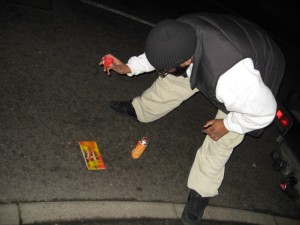
Filed under: conversations, torture | Tags: chris arendt, legal loopholes, military abuse, Moazzam Begg, prisoner/guard conversations, torture
It’s strange that everyone everywhere asks the same questions about Guantanamo. With few memorable exceptions, journalists from Finland have the same questions as young Muslim girls from Birmingham and the French film crew runs through almost exactly the same list on camera as the old Liverpool socialists do around the dinner table.
There’s the War on Islam question, the American response question, the Who’s to Blame question. But the worst question, Moazzam and Chris agree, is the Torture Question. They discuss the Torture Question as the car speeds toward Leeds.
‘People want to know the gory details,” gripes Moazzam, “Some people will be as brazen as you can imagine, “So were you tortured?”‘
‘Like: pow!’ says Chris. “And then they always seem kind of frustrated. I always try to start that off with: putting people in cages is torture. Period.”
‘The U.N. conventions against torture clearly outlaw physical or psychological torture. And so people should recognize that it’s psychological torture. And even then there’s this discussion over “What is torture?” And to try to narrow it down, that it can be some sort of: This is torture, this isn’t torture. Well, why? “Well, because I’ve written down and said so, not because I’ve experienced it. Some people say, putting someone an air conditioned room isn’t torture. Torture is pulling someone fingernails out.’
‘They’ll say, “So did you torture them?”‘ continues Chris, ‘And I’m supposed to be like, “Boy howdy, did we! First we tied em up to a bed frame and then we connected that up to a couple car batteries and then we hooked that to their testicles!” That’s what they think we’re going to say up there! And it’s like, no! It’s temperature controls, these much more subtle techniques. And then they’re like, “Oh, well, that’s not as torturous as we thought it was.” And it’s like, “That’s why they make these rules, man! Because these things sound less impactful!”
Filed under: conversations | Tags: chris arendt, describing Guantanamo, Moazzam Begg, prisoner/guard conversations, razor wire, woodpeckers
The problem with talking about Guantanamo is that Chris, Moazzam and the other detainees feel the place is unexplainable. Questions like, “What was it like?” and “How did you feel when you were there?” are guaranteed to touch of a rant or a sullen, monosyllabic reply. “What do you think that the complete deconstruction of freedom feels 650 times over, surrounding you, in cages,” shouts Chris, gesturing wildly on a Friday afternoon, “How do you think an area that condensed feels on a little desert island overlooking a cliff? How do you think that feels? BAD. I’ll just say, BAD.”

razor wire windchime
He and Moazzam think maybe the best way to help audiences visualize and understand Guantanamo is by describing the small moments there, rather than trying to explain the whole big mess of it.
Moazzam: “One of the things I used to hear was the sound of the razor wire, I don’t think most people picked it up, but it was this strange sound down on Delta Block, you know where the razor wire rubs against the barbed wire?”
Chris: Yeah
Moazzam: You know that noise?
Chris: Yeah
Moazzam: To me it sounded like windchimes, sort of a clinking, a slight tinkling… You know what I remember really well? You know the woodpeckers there?
Chris: There were woodpeckers?!
Moazzam: Maybe not on Camp Delta, but at Camp Echo, there were three resident red-headed woodpeckers, the kind that personify ‘Woody.’ And this one was sent on a mission to drive the soldiers crazy. He used to peck the metal and inside the room, the soldier would have to go out because it sounded like someone was knocking the door. And he’d go out and look around and no one was there and he’d come back in and be like, ‘What’s going on?’
Chris: That must have been pretty entertaining.
Moazzam: It was, it was so funny. I’m sure they’re going to accuse these woodpeckers of being Al Qaeda sent.
Chris: Ha! Pretty soon they’re going to have the woodpeckers in little cages.
It’s long after sunset and the car is driving through the dark toward Birmingham. Headlights flash over our seats and conversation is sporadic and relaxed.
“I don’t know any way to describe this except… touching,” says Chris, “It was always really touching when you were walking a detainee down the blocks and they would do everything they could to touch fingertips with other detainees. You’d be there all day if you let them touch everyone they wanted.”
“Yeah, but you know, that’s what makes the difference,” replies Moazzam, “a guard who would say, ‘Okay, we’re going straight through’ and the ones who would let it take a little longer.”
“When you were walking them down, there were always fingers poking out of every cell,” Chris remembers.
Filed under: speaking event
The Anglican cathedral in Blackburn, England, is the only cathedral in the world with a Muslim person on staff: Sister Anjum Anwar is tasked with helping build interfaith relationships and turning the cathedral into a place of diverse community discussion. And that was how the cathedral wound up being graced today with perhaps its most peculiar preachers ever — a skinny American anarchist and two ex-terrorist suspects.
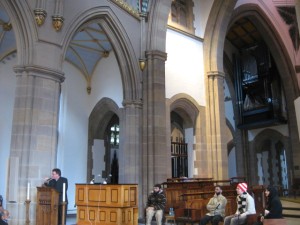
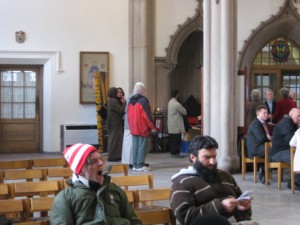
Chris and Omar in church
Reverend/journalist Chris Chivers moderated the discussion fresh off a plane from watching Obama’s inauguration. He concluded the event with a reference to the new president:
‘Christian preachers always speak in threes. If you’re unsure whether you have responsibility for what you heard here, remember the three words Barack Obama uses all the time: “We are one.” And if you’re unsure about whether we can actually make a difference, remember the other three words he uses: “Yes we can.” And finally, three of my own less poetic words, “Do. Something. Now.”‘
Filed under: conversations, speaking event | Tags: chris arendt, human rights, Moazzam Begg, toilet paper knives, violence
Thursday afternoon and we’re driving into Liverpool, which Chris and I know only as the home of the Beatles. But Moazzam and Obaid, the driver, inform us that Liverpool is more well-known these days in the UK for its self-critical humor, Irish-tinged accent and attempt to dress up its depressed economy with the city-wide slogan, “Liverpool: Capitol of Culture.”
“Watch the accent, we’re in the city of culture,” says Obaid, as we pull into the rough and tumble outskirts of town, “They’re good people here, they’re like stand up comedians. Even when they’re having a fight, they’re smiling.”
Along Edge Lane, the main road into Liverpool, all the houses are boarded up – a sight that Chris jokes makes him a little homesick for Lansing, Michigan. But here the buildings’ empty windows are covered with colorful banners. “Beatles!” reads one in maroon and purple.
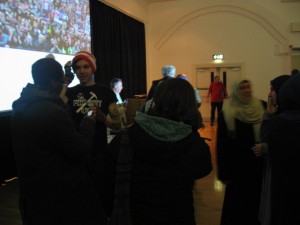
Chris Arendt - Swarmed in L'Pool
Chris is particularly glib onstage in Liverpool. Maybe it’s the Liverpool sense of humor infecting He jokes about the fact that his unit to received only one week of reclassification training to turn the Michigan artillery men into prison guards for the world’s most maximum security facility. Chris received just five hours of education about Middle Eastern and Islamic history, culture and traditions. Meanwhile, he says, “Two whole days of that training was spent getting trained on hand to hand combat to prepare us for the possibly of being stabbed with toilet paper knives. Two days of stabbing each other with little knives while shouting, ‘I will get stabbed but I will not die!'”
Laughter roars through the crowd. Knives made from toilet paper! Liverpool eats up the dark humor. Moazzam laughs, too, but after the noise dies down he brings the discussion back around.
“Although people find this funny, this is true. You were trained to believe that we as detainees were skilled at constructing impromptu stabbing devices,” says Moazzam.
“Yep. That’s why we were trained at stabbing each other with knives for two days. But the whole time we were in Cuba I never saw one of these illusive killing machines,” says Chris.
Moazzam points out that crafty ability to construct deadly knives from toilet 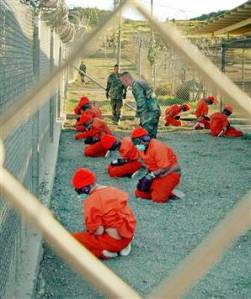 paper is part of a whole American military view of detainees not as regular humans, but some kind of insane, bloodthirsty savages.
paper is part of a whole American military view of detainees not as regular humans, but some kind of insane, bloodthirsty savages.
“When we were transported on airplanes to Guantanamo, we were made to wear facemasks in addition to blackened goggles and earmuffs. I never understood why they did that, why they thought the facemasks were necessary, until I heard Donald Rumsfeld explaining, “These people are so dangerous that they will chew through the cables of an aircraft to try and bring it down.”
“Toilet Paper Knives” has become such a joke on this tour that I had to ask Moazzam and Jarallah Al-Marri one day, “So… how do you make a toilet paper knife?” They had no idea. Luckily, I found simple instructions online, if you’re looking for a politically relevant Sunday afternoon craft project.
Filed under: Islam, legal loopholes | Tags: hicham yezza, legal loopholes
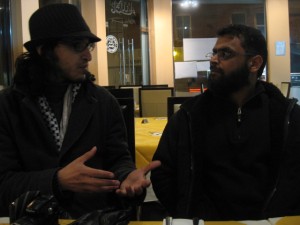
Hicham and Moazzam talk it out
Monday night at Nottingham University, one bizarre legal case met another: Moazzam Begg, who was detained in American prisons for three years after traveling to Afghanistan to build a school, shook hands with Hicham Yezza, a University of Nottingham employee and peace activist who was arrested last April, imprisoned and nearly deported for having a copy of an Al Qaeda training manual. This manual was downloaded off the U.S. Department of Defense website for a student who was writing a research paper about Al Qaeda. As England’s Home Office is pushing to deport Hicham, he has become a symbol in Nottingham of the University administration’s repression of academic freedom and an example nationwide of the sometimes ludicrous enforcement of anti-terror laws.
Hicham is an artistic and soft spoken 30-year-old. For the last eight months, Hicham has not been allowed to hold a job and has been completely supported financially by friend and donations to the FREE HICH group. When we met up Monday night, he was preparing to sell all his books to help pay legal fees.
Why wasn’t this something you and the university couldn’t just talk out?
Because the people who are running this university which is similar to people around the country who run similar institutions are extremely scared and, I’m afraid to say, bigoted, they think it’s will just it’s not worth taking the risk when it comes to Islam and Muslims. Unfortunately, it’s us as people who think do we take a chance on this guy who’s lived here for 15 years, who’s been a very prominent peace activist on campus, who’s done a lot of work for the university. Do we just give him the benefit of the doubt and ask him or do we not take any chances and go to the police directly? Even the government says, do your own inquiry first and then come to us but there was no independent inquiry. Within two hours they called the police, they said, ‘The guy has a funny name, he’s Muslim, let’s let the police deal with him.'”
Do you think that all this marching and protesting for you has actually been effective or are all the decisions being made by out-of-touch bureaucrats at the top who don’t care about all the shouting?
Let’s just look purely at the concrete achievements of this campaign. Eight months ago, I was locked up in a cell, solitary confinement, with a plane ticket booked me with the direction of the Home Office saying, ‘This guy is getting on that plane. Essentially what we have is a massive campaign, students turning out for demos, succeeded in stopping the deportation, in getting me out and for eight months, paying my bills, my living expenses and my legal expenses. This is a campaign that essentially has more than 70,000 members and this is how they have essentially succeeded in beating a very stubborn, very powerful system.
Moazzam has spoken about the idea that being locked up in Guantanamo Bay was an experience that made some of the detainees more political, more radicalized. How does that compare to your experience? Has this made you more political or has there been a strong incentive to back off?
Well, I’ve always been real political beforehand, which is part of the reason I got into trouble. Essentially when I got arrested, I had these guys questioning everything I did, from the work in theater I did, to my photography, my cartooning, my art, my interests in music, my trips to book festivals, anything that in a normal human you’d treat as a good thing, as a commendable thing, they were treating as suspicious they were for no other reason as far as I could tell than for me being a Muslim. They thought it was strange that a Muslim would go to a book festival. It couldn’t be my interest in books, it must be something more sinister. I didn’t get more political in that sense I knew there was a lot of pressure on me to take a step back but I refused to.
Filed under: gitmo policy | Tags: guantanamo policy, Obama, prisoner/guard conversations
Yesterday Obama announced that he would call an end to the military tribunals in Guantanamo, but today came even bigger news: he issued executive orders to shut down Guantanamo within the year AND shut down the CIA’s entire secret prisons program.
Chris, Moazzam and other detainees have often expressed skepticism that Obama would actually follow through on his campaign promises about Guantanamo, but today’s news was a big step in the right direction.
The two discuss the news as they drive through Liverpool, England, to the night’s speaking gig at a university in town.
“He’s mentioned Guantanamo twice now and the fact that he’s calling for its closure within a year is fantastic,” says Begg. He thinks on it for a few moments. “But a year is a long time if you’re a prisoner. If you were told now, ‘You’ll be free in a year after you’ve been here for seven years’ – how do you feel about that? It’s good in a sense because at least you know how long you’ve got left.”
“You’ve got some finite limit,” adds Chris.
“I wonder if the guys inside know though?” I asked.
“Oh I’m sure they’ll find out,” says Moazzam.
“All it takes is one guard that can’t keep his mouth shut and the whole camp’ll know,” affirms Chris.
Chris’s roots in rural Libertarian Michigan and six years in the National Guard have reared him an absolute cycnic when it comes to government, however. He still feels much the same way he did on Obama’s inauguration day, when he sounded off about the politician in the lobby of a Sheffield hotel.
“I know I sound like a pessimist. I know Obama comes from this cool background and I know just him being in office means a whole lot, but seriously it’s going to take actual actions until I believe he’s done anything worthwhile. Politicians talking, it’s nothing new.”
Closing Guantanamo is a step, says Chris, but he believes it may be the easiest step of many Obama will need to take to right the wrongs of the last seven years. Chris starts ticking off the things Obama needs to do before Chris will consider him successful. “Complete withdrawal from Iraq and Afghanistan, openly criticizing US detentions policy and issuing some kind of reparations or apology to those guys who were illegally detained, rebuilding our legal system so that things like this can’t happen again. This has proven the Supreme Court impotent, it’s proven Congress impotent, it’s pretty much given complete authority to the president and the president alone.”
For the first time during the eight panel discussions that Moazzam and Chris
have led during the last two weeks, I actually didn’t get to see them speak. That’s because I showed up late to the Manchester Metropolitan Lecture Hall (thanks to the impossibility of tracking down a cup of coffee after 6PM in Manchester) and the event was so packed I could not get in. The room was absolutely stuffed full of a mostly young, student crowd. This is the view through the back door:
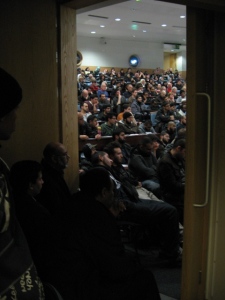
How to fit 500 people into a 300 person lecture hall
But there’s some good news for people who haven’t gotten the chance to hear Moazzam and Chris speak at all. The organizers of Tuesday’s event in Sheffield uploaded audio of the whole on-stage conversation between Moazzam, Chris and former detainee Omar Daghayes. Check it out at Sheffield Indymedia.
